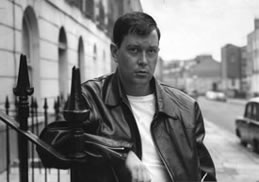In
his short career, Joe Orton’s published work amounted
to three stage plays, four short plays for radio and television,
one film script and one posthumously published novel.
In Prick Up Your Ears, John Lahr defines Ortonesque as
‘shorthand for scenes of macabre outrageousness’ and regards Orton’s farce as ‘a
combination of elegance and crudity’,
which ‘is always ridiculous.’
While often described as ‘promising’, the
posthumous success of his plays reveal a far greater talent.
With What the Butler Saw, Orton had matured into satirical
and farcical master, who was prepared to speak the unspeakable
and tackle society’s taboos and hypocrisy head on.
Orton rejected conventional morality and followed his
own path, both with his works and his life.
There is a danger that Orton’s private life could
overshadow his work, as his life story could be a script
from one of his own plays: semi-literate, working class
boy suffering years of penury and rejection sent to prison;
a promiscuous homosexual in an age when it was both illegal
and actively persecuted by the police; success, wealth
and awards, ending with murder.
Orton’s life is undeniably bound up with his work,
but it cannot be forgotten that the most successful period
of his life, 1963 to 67, were also years of major social
and political change. As Dr Francesca Coppa writes:
'Orton was a young
man in the midst of an exploding youth culture…working
class at a time when the working classes were forming
an alternative British intelligentsia.’
